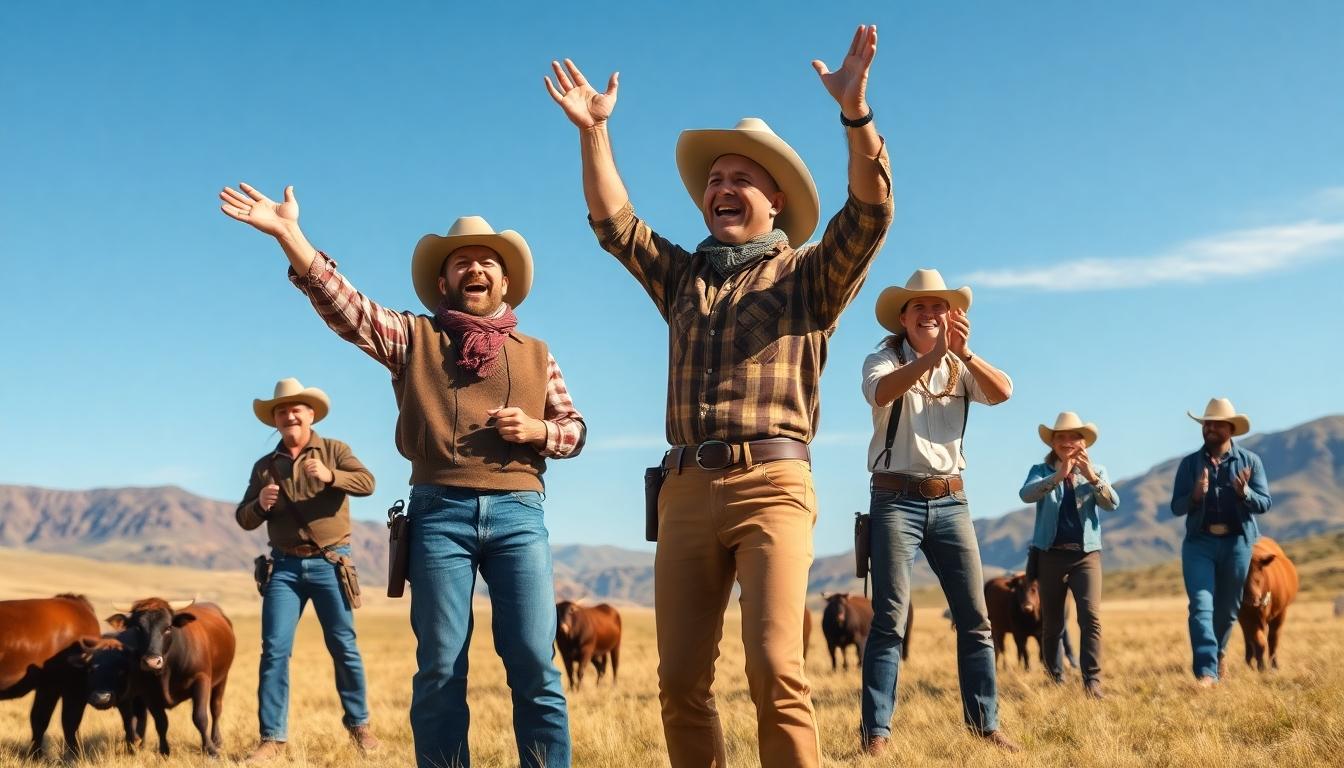Ever wondered what happens when humor meets the alpine tradition of yodeling? We’ve rounded up the most hilarious yodel jokes that’ll have you laughing from mountain peak to valley floor! These witty one-liners and puns combine the unique vocal technique of the Swiss Alps with comedic genius.
We know finding quality yodel humor can be challenging in today’s digital industry. That’s why we’ve curated this collection of the funniest yodel-themed jokes that are perfect for lightening the mood at parties, impressing friends, or simply enjoying a good chuckle. From clever wordplay to absurd scenarios involving yodelers, our list has something for everyone.
7 Hilarious Yodel Jokes That Will Have You Laughing From the Mountains
- Why did the yodeler break up with his girlfriend? Because she couldn’t handle his emotional ups and downs! His constant vocal rollercoaster from low to high notes was just too much drama for their relationship.
- What do you call a yodeler who’s lost his voice? A nodeler! Without those powerful vocal projections, he’s just standing there nodding on the mountainside looking rather confused.
- How many yodelers does it take to change a lightbulb? Just one, but it’ll take FOOOOOUUUUR hours because he can’t stop singing about it! Every simple task becomes an alpine performance.
- What’s a yodeler’s favorite exercise? Vocal mountaineering! They’re always climbing up and down those musical scales with impressive agility and endurance.
- Did you hear about the yodeler who got arrested? He was charged with disturbing the Alps! The local mountain goats filed a formal complaint after their peaceful grazing was interrupted.
- Why don’t yodelers tell good secrets? Because everything they say ECHOOOOOES for miles! Their confidential information tends to bounce from mountain to mountain.
- What did the Swiss cheese say to the yodeler? “We make a great pair—you’re full of high notes, and I’m full of holes!” Together they represent the perfect Swiss cultural experience.
The Origins of Yodeling: A Brief History Before the Humor

Yodeling’s origins stretch far beyond the comedic area, with roots that are surprisingly global and ancient. While many associate this distinctive vocal technique with Alpine regions, ethnomusicologists have found evidence of parallel development across many cultures throughout history. The practice commonly linked to Swiss and Austrian mountain traditions actually has a much deeper history that’s worth exploring before we jump into the humor it later inspired.
Research suggests yodeling may date back approximately 10,000 years to central-west Africa, where similar vocal techniques appeared in traditional lullabies and communal calls across valleys. Prehistoric migration patterns likely contributed to yodeling’s spread across continents, though many experts believe it developed independently in various regions including parts of Asia and among Native American communities.
By the 16th century, Bavarian herders had adopted yodeling as a practical communication method across Alpine valleys, using the distinctive vocal technique to transmit messages over long distances. Swiss communities integrated this unique vocal style into their dairy herding practices, using specialized yodels to call livestock across mountainous terrain.
The journey of yodeling to America came primarily through German immigrants in the 1800s, where it underwent a fascinating cultural fusion. In the United States, European yodeling traditions merged with African American “field hollers” and Scandinavian “kulning” (cow-calling songs) to create new hybrid styles. The Hutchison Family Singers helped popularize yodeling in mid-19th-century American performances, though it’s worth noting that minstrel shows of the era often parodied it as “Tyrolesian business,” planting early seeds for the humor that would later surround this vocal art.
As we entered the 20th century, yodeling transformed into something of a novelty within country music, frequently exaggerated for comedic effect in films and recordings. This commercialization and stylization laid the groundwork for modern “yodel jokes” that typically play on the perceived quirkiness of the technique or lean into Alpine stereotypes for humorous effect.
While no direct historical records pinpoint the first yodel-related jokes, their emergence clearly aligns with the commercialization and parody of yodeling in 19th-century entertainment. Comedy performers like Jimmy Rodgers and animated cartoons such as Warner Bros.’ “The Yodeling Yokel” further cemented yodeling’s associations with humor, often linking the vocal style to rural or “hillbilly” characterizations that audiences found amusing.
Alpine Antics: Classic Yodel One-Liners That Never Get Old

Yodel jokes have a unique charm that resonates with both alpine enthusiasts and comedy lovers alike. These one-liners capture the playful essence of yodeling culture while delivering quick laughs that stand the test of time.
Mountain Musician Zingers
Mountain musicians know how to bring humor to great heights, especially when it comes to yodeling. One classic joke involves a father’s shower routine: “Papa heads in to take a shower and yells to his wife, ‘Ima head’n in to take a shower. You’ll hear me yodel’n. If I stop yodel’n, come in and fetch me out…'” This joke perfectly captures the practical uses some creative yodelers find for their vocal talents beyond entertainment.
Another timeless yodeling joke plays on sound effects: “There was a fire in a yodelling school. Everyone was to exit in an orderly fashion.” The humor lies in imagining the chaotic yet melodious evacuation of yodeling students maintaining their practice even during an emergency.
The yodeling knock-knock joke remains a favorite at parties: “Knock knock.” “Who’s there?” “Little old lady.” “Little old lady who?” The punchline sounds exactly like “Yodel-aay-ee-ooh” when spoken quickly, creating an unexpected yodeling finale to the classic joke format.
Swiss Miss Wisecracks
Swiss culture and yodeling go hand in hand in the comedy industry. While exact documented Swiss-themed jokes may be scarce, the concept provides rich material for humor about Alpine traditions. A popular theme revolves around miscommunications between Swiss yodelers and tourists who misinterpret the mountain calls as cries for help.
The classic microphone joke showcases the traditional yodeler’s commitment to authenticity: “Why did the yodeler refuse the microphone? He said, ‘I yodel to the hills, not to the amps!'” This one-liner highlights the purist nature of traditional yodelers who prefer natural acoustics over modern technology.
Swiss Miss characters in jokes often embody both the precision of Swiss culture and the free-spirited nature of yodeling. These characters typically navigate humorous situations involving cultural differences, like a Swiss Miss attempting to teach yodeling to foreigners who can’t grasp the rapid transitions between vocal registers.
Why Did the Yodeler Cross the Alps? Punny Yodel Jokes

Yodel jokes cleverly combine wordplay with cultural references to create unique mountain-themed humor. These puns capitalize on the distinctive vocal technique and Alpine associations that make yodeling such a fertile ground for comedy.
High-Altitude Humor
Why did the yodeler cross the Alps? To get away from the echoes! This classic joke plays on the well-known phenomenon of mountain echoes that yodelers often encounter. Mountain-based yodel humor frequently references the high altitudes where this vocal tradition flourished. Swiss yodeling jokes particularly resonate with audiences familiar with the cultural significance of yodeling in mountainous regions. The elevation theme provides ample material for comedic setups, connecting the physical height of mountains with the high notes yodelers hit. Professional comedians often incorporate these geographical elements to create relatable humor for both alpine enthusiasts and casual joke lovers.
Echo-Worthy Punchlines
What do you call a yodeler who performs in the bathroom? A shower-yodeler! This punny joke demonstrates the versatility of yodel humor in everyday contexts. Blocking the yodeling line in Switzerland can cause serious problems because it delays “he who is next” – a clever play on words that references both queuing and the rhythmic nature of yodeling. Knock-knock jokes featuring yodeling are especially popular, with the classic “Little Old Lady” joke playing on how “Little old lady who?” sounds remarkably similar to the traditional yodeling phrase “Yo-del-aay-ee-ooh.” Another variation, the “Yoda Lady” joke, culminates with the punchline “Good job yodeling!” – creating an unexpected connection between Star Wars and Alpine traditions. These punchlines work because they surprise listeners with clever linguistic twists while celebrating the unique cultural heritage of yodeling.
Yodel-Ay-Hee-Who? Character-Based Yodel Humor

Character-based yodel humor capitalizes on the inherent incongruity between alpine stereotypes and unexpected modern scenarios. Research suggests that effective comedy often emerges when audience expectations clash with character traits, making yodeling a perfect vehicle for this type of humor. The exaggerated vocal breaks and distinctive pitch shifts of yodeling create natural opportunities for surprise—a fundamental element in successful joke construction.
Many yodel jokes rely on established character types that audiences immediately recognize, such as the Swiss mountaineer, the Bavarian herder, or the vaudeville entertainer. These character archetypes have oscillated between solemn and humorous expressions throughout American music history, giving joke tellers plenty of material to work with. Yodeling’s journey from spiritual incantation to entertainment medium has created a rich tapestry of stereotypes that comedians can subvert for laughs.
The mechanics of character-based yodel humor work best when they tap into shared cultural knowledge. When we create jokes featuring yodeling characters, we’re building on audience familiarity with musical tropes and regional associations. This approach mirrors findings in educational humor studies, which demonstrate that character-driven comedy enhances engagement when balanced appropriately with content.
Creating effective yodel character jokes requires understanding the delicate balance between authenticity and exaggeration. The sudden pitch shifts characteristic of yodeling can be amplified for comedic effect, playing on the auditory surprise that naturally occurs when someone transitions between chest voice and falsetto. Juxtaposing traditional Alpine costumes with contemporary settings offers another rich vein of humor that builds on established joke structures documented in humor research.
Yodel character humor thrives when it plays with status and expectation. A corporate executive suddenly breaking into yodel during a board meeting creates comedy through the stark contrast between professional setting and folk expression. The theoretical construction of these jokes aligns perfectly with documented humor patterns, though exact academic research on yodel jokes remains an unexplored frontier in humor studies.
Modern Twists on Traditional Yodel Jokes

Yodel jokes have evolved significantly in recent years, incorporating contemporary elements while maintaining their classic charm. We’ve collected some of the most entertaining modern takes on traditional yodel humor that blend cultural references with the timeless appeal of this unique vocal technique.
- Mic Drop Joke
Today’s performers often joke about the clash between traditional and modern performance styles. A popular quip features a yodeler refusing a microphone, proudly declaring, “I yodel to the hills, not to the amps!” This humorous contrast highlights the authentic outdoor roots of yodeling against our technology-dependent entertainment industry.
- Shower Yodeler
Domestic life provides fertile ground for updated yodel humor. One particularly relatable joke involves a shower-loving yodeler who instructs his wife, “If you don’t hear me yodeling, come check on me!” This modern twist brings the alpine tradition into everyday household scenarios, making it accessible to contemporary audiences.
- Knock-Knock Joke
Classic joke formats have embraced yodeling with clever linguistic tricks. The brilliance of the “Little old lady who?” knock-knock joke lies in its punchline that transforms the question into “Yodel-aay-ee-ooh” when spoken aloud. This wordplay demonstrates how traditional joke structures can perfectly accommodate yodeling’s distinctive sounds.
- Turtle Yodeler
Relationship humor gets a yodeling makeover in the story of someone falling deeply in love, only to discover their partner can’t stand their beloved pet—a turtle they’ve painstakingly taught to yodel. This absurdist combination of unexpected animal training and yodeling creates a distinctly modern comedic scenario that subverts expectations.
These contemporary yodel jokes showcase the remarkable adaptability of yodeling humor. From technology contrasts to domestic situations, the distinctive vocal technique continues to inspire creative comedy that resonates with today’s audiences while honoring its traditional roots.
Yodeling Joke Etiquette: When and Where to Share Your Alpine Humor

Yodel jokes thrive in exact settings where their unique brand of alpine humor can be fully appreciated. Based on our research, these jokes primarily rely on clever wordplay and phonetic mimicry, creating punchlines that echo the distinctive vocal patterns of traditional yodeling. Understanding when and where to share these jokes ensures they land with maximum impact while respecting social boundaries.
Appropriate Settings for Yodel Humor
Casual gatherings provide the perfect backdrop for yodel jokes, especially parties or outdoor activities where lighthearted banter naturally flows. Music and themed events centered around alpine traditions or folk culture offer receptive audiences who already appreciate the cultural context behind yodeling humor. Lighthearted conversations benefit from occasional yodel jokes, though we recommend using them sparingly to maintain their comedic effectiveness and prevent joke fatigue.
Situations to Avoid
Professional environments and formal settings generally don’t welcome yodel humor, as these jokes can disrupt the serious tone of business meetings or official proceedings. Solemn occasions require more sensitivity, making yodel jokes inappropriate during ceremonial or reflective moments. Audiences unfamiliar with yodeling traditions might miss cultural references embedded in the jokes, resulting in confusion rather than laughter.
Delivery Tips for Maximum Impact
Clarity matters tremendously when telling yodel jokes, particularly when emphasizing punchlines connected to yodeling’s distinctive vocal style. Timing your jokes during relaxed moments amplifies their whimsical charm and increases receptiveness. Call-and-response jokes like the “Yodel-lay-he” knock-knock variation work exceptionally well with audiences familiar with yodeling’s musical rhythms.
Cultural Sensitivity Considerations
Jokes involving yodelers in everyday scenarios (like the popular shower yodeling gag) should prioritize brevity and good taste. Phonetic-based humor requires careful delivery to ensure the audience catches the wordplay involved in phrases designed to evoke the “Yodel-aay-ee-ooh” sound. Thoughtful sharing of yodel jokes celebrates alpine traditions’ quirkiness without overstepping social boundaries or relying on crude humor that might offend certain audience members.
Conclusion: Keeping the Tradition of Yodel Humor Alive
Yodel jokes represent the perfect harmony between musical tradition and humor. They’ve evolved from alpine origins to become versatile comedic tools that bring smiles across generations.
We hope this collection has given you plenty of material to share at your next gathering or simply brightened your day. Whether you’re a yodeling enthusiast or just someone who appreciates clever wordplay there’s something uniquely charming about these jokes.
Remember that the best yodel humor respects the rich cultural heritage while finding new ways to make us laugh. So go ahead and share these jokes with friends and family. The mountains may echo but laughter resonates even further!
Frequently Asked Questions
What is the origin of yodeling?
Yodeling originated approximately 10,000 years ago in central-west Africa, where similar vocal techniques were used in traditional lullabies and communal calls. It also developed independently among Bavarian herders who used it for long-distance communication in the Alps. The practice came to America through German immigrants in the 1800s, where it blended with other musical traditions and became a novelty in country music.
How did yodeling humor develop?
Yodeling humor developed as the technique became commercialized and stylized, particularly after German immigrants brought it to America in the 1800s. The perceived quirkiness of the technique, combined with Alpine stereotypes, created fertile ground for jokes. Comedic performers and animated cartoons in the 20th century further solidified yodeling as a source of humor in popular culture.
What makes a good yodel joke?
A good yodel joke typically plays on the distinctive characteristics of yodeling, such as vocal pitch changes, Alpine associations, or echo effects. The best yodel jokes balance cultural references with clever wordplay, create humorous incongruities, or use character-based humor that contrasts Alpine stereotypes with unexpected scenarios. Effective delivery and timing also enhance the comedy.
Where is it appropriate to tell yodel jokes?
Yodel jokes are best shared in casual gatherings, parties, themed events (especially those with Alpine, Swiss, or German themes), or music-related social functions. They’re less appropriate in professional settings, solemn occasions, or formal environments. Always consider your audience’s cultural background and whether they’ll appreciate the humor.
Are yodel jokes culturally sensitive?
When delivered respectfully, yodel jokes can celebrate rather than mock the tradition. Focus on the technique and sounds rather than stereotyping people. Avoid jokes that portray yodelers as unintelligent or that ridicule specific cultures. The best yodel humor appreciates the skill involved while finding humor in the distinctive sounds and associated imagery.
How has yodel humor evolved over time?
Yodel humor has evolved from simple stereotypical jokes to more sophisticated humor that incorporates contemporary references while honoring traditional elements. Modern yodel jokes often include relatable scenarios, technological contrasts, or absurdist elements while maintaining the classic characteristics that make yodeling inherently humorous. This evolution keeps yodel humor fresh and relevant.
What are character-based yodel jokes?
Character-based yodel jokes center around fictional yodelers in unexpected situations, playing on the incongruity between alpine stereotypes and modern scenarios. These jokes use established character types like the Swiss mountaineer or Bavarian herder and create comedy through contrasts in settings and expressions. The sudden pitch shifts of yodeling often amplify the comedic effect in these character-driven narratives.







